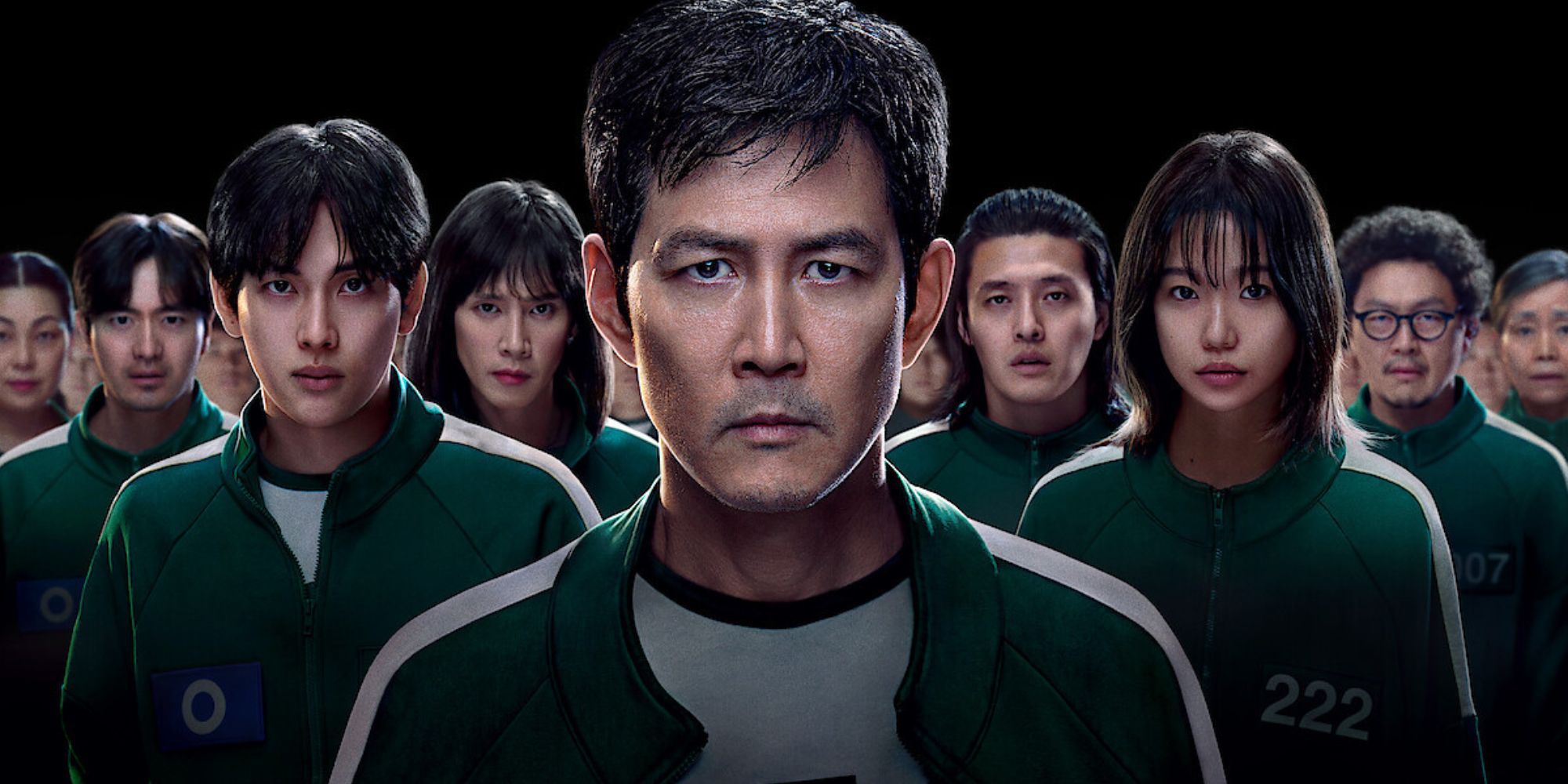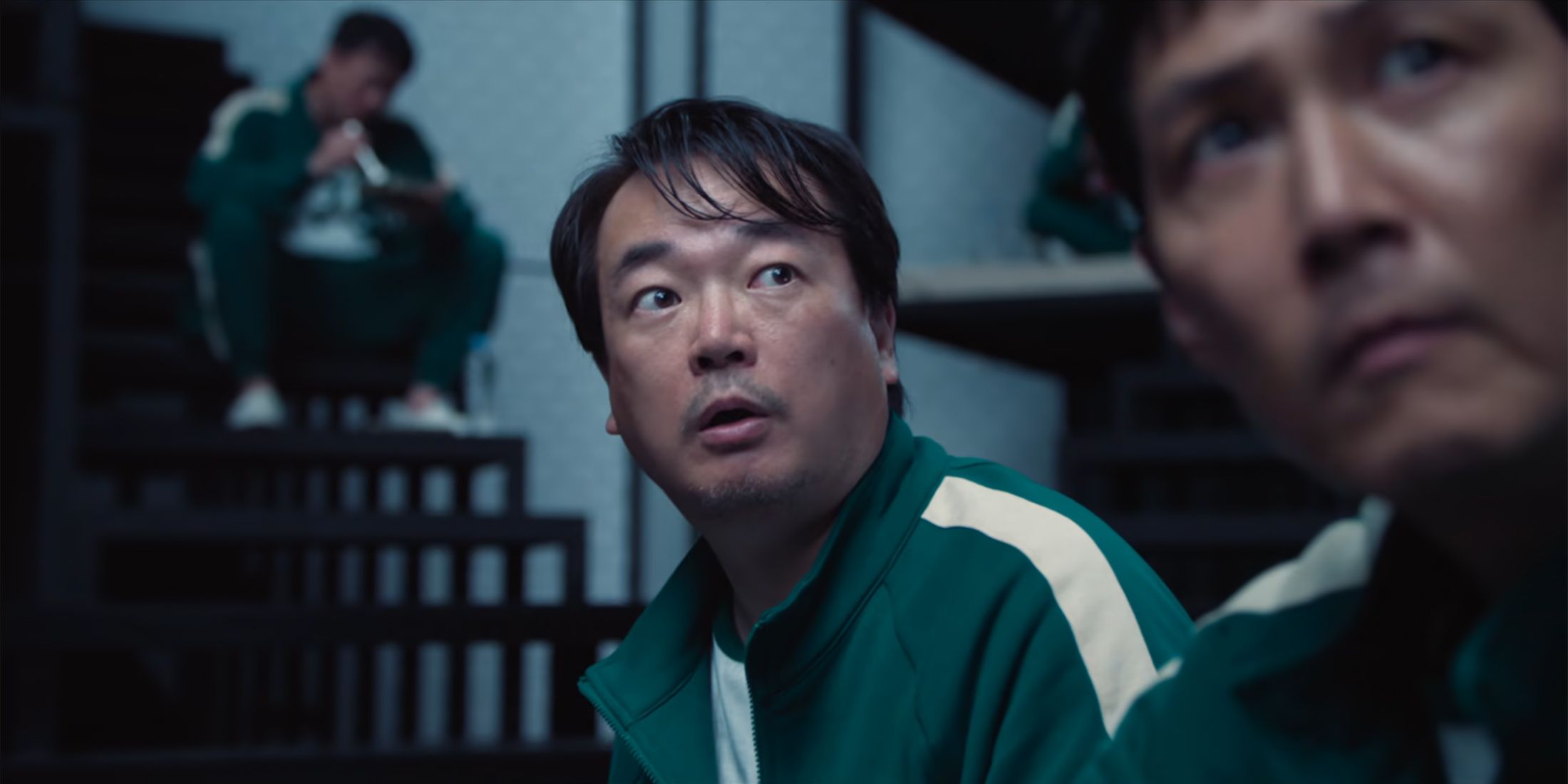Jung Bae Squid Game: How Carl Jung's Ideas Reveal The Show's Core
It's quite something to think about, isn't it, how a brutal survival drama like "Squid Game" might actually connect with the deep psychological insights of someone like Carl Gustav Jung? This article explores the intriguing possibility that the intense world of "Squid Game" offers a vivid stage for Jung's profound theories about the human mind, offering us a new way to look at the show. We're going to unpack the idea of "jung bae squid game" by seeing how Jung's work helps us grasp the show's lasting appeal and its very dark messages.
The Netflix hit, "Squid Game," truly captured imaginations around the globe, showing us a group of desperate individuals risking their lives in deadly children's games for a huge cash prize. Its stark portrayal of human desperation, social inequality, and the raw instinct for survival really made people think. So, it made us wonder about the deeper reasons for why people behave the way they do when faced with such extreme circumstances, you know?
Carl Gustav Jung, a Swiss psychiatrist, gave us some powerful ideas about personality, psychodynamics, and the shaping energies of social history. He truly believed that all humans share a collective unconscious, a kind of inherited mental blueprint that forms the basis for myths and religion. So, when we look at "Squid Game" through a Jungian lens, we might just find that its stories and characters resonate with these ancient, shared patterns of the human experience, actually.
- Zack De La Rocha
- Good Day Forrest Frank
- Jw Marriott Desert Ridge
- Shu Jiao Fu Zhou
- Remoteiot Vpc Ssh Windows 10 Without
Table of Contents
- Jung Bae Squid Game: An Unexpected Connection
- Who Was Carl Gustav Jung?
- Personal Details & Bio Data
- The Collective Unconscious in Squid Game
- Archetypes at Play: Characters Through a Jungian Lens
- The Hero and the Shadow
- The Trickster and the Wise Old Man
- Squid Game's Reflection of Society's Psyche
- Why This Jungian View Matters
- Frequently Asked Questions
- Conclusion
Jung Bae Squid Game: An Unexpected Connection
The phrase "jung bae squid game" brings together two seemingly different worlds: the intricate psychological theories of Carl Gustav Jung and the gripping narrative of "Squid Game." At first glance, you might think, "What could a 20th-century Swiss psychiatrist possibly have to say about a modern South Korean survival thriller?" Yet, upon closer inspection, the connections become quite clear, actually. Jung's work offers a powerful framework for understanding the show's universal themes and the intense reactions it draws from its audience. It's almost as if the show, in its own way, acts out some of the very ideas Jung explored about the human mind and its deeper layers, you know?
Jung, a prolific author of over twenty books, truly dedicated his life to exploring the depths of the human psyche. He established analytical psychology, advancing ideas like introvert and extrovert personalities, archetypes, and the power of the unconscious. His work has impacted many fields, including philosophy, anthropology, theology, and most of the arts. So, it's not a stretch to think his ideas could help us make sense of a cultural phenomenon like "Squid Game," which, in some respects, really touches on fundamental aspects of human nature, doesn't it?
This exploration of "jung bae squid game" isn't about finding a direct reference to Jung in the show itself. Instead, it's about using his profound insights as a tool to dissect the show's psychological weight. We're looking at how the characters, their struggles, and the very structure of the games mirror the universal patterns and psychic forces Jung described. This approach, you see, helps us move beyond just the surface-level entertainment and really appreciate the show's deeper, more unsettling truths about humanity, as a matter of fact.
- Sid From Toy Story
- Riley Green Wife
- Jackerman Mothers Warmth
- Audrey Le Strat Age
- Descargar Video De Instagram
Who Was Carl Gustav Jung?
Carl Gustav Jung was a Swiss psychiatrist, psychotherapist, and psychologist, a truly brilliant mind of the 20th century. He founded the school of analytical psychology, which offered a distinct tradition of analytic thought, differing from Freud's ideas. Jung truly believed in the power of the unconscious, but he expanded on it significantly, arguing for a collective unconscious shared by all humans, which they inherit at birth. This shared reservoir of experiences, he felt, forms the foundation for myths and religion, you know?
His belief in this collective unconscious came from his experience with patients and their dreams. He noticed how often those dreams resembled ancient myths and fairy tales, and how those stories were similar across cultures. This, for him, was evidence of universal patterns of thought and feeling that exist independently of individual experience. Jung strove for the integration of empirical science with the humanities, and his work lives on in many ways, influencing how we think about personality, psychodynamics, and the forces that shape our social history, actually.
Through his personal experience, his work with patients, and extensive research, Jung developed ideas and methods of inquiry that have deepened and broadened our understandings of personality and the shaping energies of social history. He died in 1961, leaving behind a legacy as a prolific author of over 20 books. His impact continues to be felt across numerous fields, which is really something, isn't it?
Personal Details & Bio Data
| Detail | Information |
|---|---|
| Full Name | Carl Gustav Jung |
| Nationality | Swiss |
| Profession | Psychiatrist, Psychotherapist, Psychologist |
| Known For | Founding Analytical Psychology, Collective Unconscious, Archetypes, Introvert/Extrovert Personalities |
| Born | July 26, 1875 |
| Died | June 6, 1961 |
| Authored | Over 20 books |
| Impacted Fields | Psychology, Philosophy, Anthropology, Ecopsychology, Theology, Arts |
The Collective Unconscious in Squid Game
Jung argued that all humans share a collective unconscious, a deep, inherited part of our minds. This part holds universal patterns and images, what he called archetypes, which are the building blocks for myths, religions, and even our dreams. When we think about "Squid Game," it's almost as if the show taps directly into this shared human experience, resonating with fears and desires that feel ancient and deeply familiar, you know?
The games themselves, for instance, are twisted versions of children's playground activities. Red Light, Green Light; Tug-of-War; Marbles – these are games many people played as kids. The show takes these innocent memories and injects them with a brutal reality, creating a sense of dread that feels universally unsettling. This manipulation of familiar, almost primal, play scenarios, in some respects, stirs up a collective memory of innocence lost or childhood vulnerability, doesn't it?
The core premise of "Squid Game" – desperate people competing for survival and wealth – also speaks to very basic human drives. The fear of poverty, the desire for a better life, the willingness to do almost anything to escape hardship – these are not unique to any one culture or time. They are, you could argue, universal struggles that reside in our collective unconscious, shaping our myths of triumph and tragedy. The show, therefore, really hits home because it mirrors these deep-seated concerns that, basically, we all carry within us, actually.
The show's exploration of trust and betrayal, too, feels incredibly resonant. The alliances formed and broken, the moral compromises made under pressure, the very human tendency to both cooperate and compete – these are themes that have played out in stories and real-life scenarios for as long as humans have existed. It's like the show, in a way, provides a modern myth about these fundamental aspects of human interaction, making it incredibly powerful, you know?
Archetypes at Play: Characters Through a Jungian Lens
Jung's concept of archetypes helps us understand the universal patterns of behavior and personality that appear in myths, stories, and, very clearly, in "Squid Game." Archetypes are not specific characters but rather models of people, behaviors, or personalities that are present in the collective unconscious. When we watch the show, we can spot many of these archetypal figures, which is kind of interesting, isn't it?
These archetypes give the characters a depth that goes beyond their individual stories. They connect them to a broader human narrative, making their struggles and choices feel more significant. So, by recognizing these archetypal patterns, we can gain a richer appreciation for the show's psychological complexity and its ability to tap into our shared human experience, as a matter of fact.
The Hero and the Shadow
Seong Gi-hun, the main character, embodies the archetype of The Hero. He starts as a flawed, down-on-his-luck individual, a gambler and a struggling father, but he eventually undergoes a transformation. His journey through the games is a classic hero's quest, facing trials, making sacrifices, and ultimately, in some respects, seeking to right wrongs. He's not a perfect hero, which makes him more relatable, but his drive to protect others and his eventual moral stand are very much in line with this archetype, you know?
The Shadow archetype represents the darker, repressed aspects of the self, both individually and collectively. In "Squid Game," the Shadow manifests in several ways. We see it in the players' desperate actions, their betrayals, and the brutal lengths they go to for survival. The Front Man, the mysterious figure overseeing the games, also serves as a powerful manifestation of the Shadow, representing control, hidden motives, and the dark side of power. The VIPs, too, embody a collective Shadow of society's greed and indifference, which is pretty chilling, actually.
The internal struggle within Gi-hun, between his desire to win and his innate goodness, is a clear example of the Hero confronting his own Shadow. His journey is not just about surviving the games; it's about grappling with the moral decay around him and, ultimately, deciding what kind of person he wants to be. This internal conflict, you know, is a central theme in Jungian thought, where integration of the Shadow is a key step towards wholeness, really.
The Trickster and the Wise Old Man
Oh Il-nam, Player 001, initially appears as the Wise Old Man archetype. He's an elderly, seemingly frail participant who offers Gi-hun comfort and guidance. He possesses a calm demeanor and offers insights that seem to come from a deep well of life experience. This figure often provides wisdom and direction to the hero, which he certainly does for Gi-hun, especially in the marble game, doesn't he?
However, Il-nam later reveals himself to be the creator and mastermind of the games, a shocking twist that redefines his role as The Trickster. The Trickster archetype often disrupts established norms, uses deception, and challenges expectations, sometimes for destructive purposes, sometimes to reveal hidden truths. Il-nam's true identity completely upends our perception of him, showing a manipulative and cynical side that perfectly fits the Trickster's nature. He plays with the lives of others, creating chaos and revealing the darkest aspects of human nature for his own amusement, basically.
This dual role, where the Wise Old Man transforms into the Trickster, is a very powerful Jungian concept. It shows how archetypes can be complex and multi-faceted, not always fitting neatly into one box. Il-nam's character forces us to question appearances and consider the hidden motivations that drive people, which, you know, is a truly fascinating aspect of the show, isn't it?
Squid Game's Reflection of Society's Psyche
Jung believed that myths and fairy tales are not just old stories; they are expressions of the collective unconscious, reflecting universal human experiences and psychological truths. "Squid Game," in many ways, functions as a modern myth for our times. It tells a story that, in some respects, resonates deeply with global audiences because it touches on anxieties and struggles that are widely felt, you know?
The show's depiction of extreme wealth disparity and the desperation it creates speaks to a collective unease about economic systems and social justice. The idea of being trapped in a system where the only way out is through brutal competition, or by dying, is a very powerful metaphor for many people's experiences in the modern world. This kind of narrative, you see, acts as a mirror, reflecting back the collective psyche's worries and frustrations, actually.
The very concept of the games, where people willingly participate in their own destruction for a chance at salvation, also taps into a collective fascination with extreme situations and moral dilemmas. It asks us, as viewers, what we would do in such a scenario, forcing us to confront our own values and survival instincts. This engagement with profound moral questions is a hallmark of stories that resonate with the collective unconscious, making "Squid Game" more than just entertainment, but a commentary on the human condition, basically.
Through its characters and plot, the show explores themes of choice, fate, individual responsibility, and the corrupting influence of power. These are timeless themes that have been explored in myths and stories across cultures for centuries. "Squid Game" simply presents them in a new, very stark, and unforgettable way, which is, you know, why it made such a huge impact, isn't it?
Why This Jungian View Matters
Looking at "Squid Game" through Carl Jung's psychological framework offers more than just an academic exercise. It deepens our appreciation for the show's artistry and its profound impact. By recognizing the collective unconscious and archetypes at play, we can see how the series taps into universal human experiences, making it resonate far beyond its specific cultural context. It's almost like a secret language the show speaks, and Jung gives us the key to understand it, doesn't it?
This perspective helps us understand why the show felt so impactful and, in some respects, even disturbing to so many. It wasn't just the violence or the plot twists; it was the way it touched upon very deep-seated fears, desires, and moral questions that we all carry within us. The show, in a way, held up a mirror to our collective human nature, forcing us to confront some uncomfortable truths about ourselves and our societies, actually.
Moreover, applying Jungian analysis to popular culture like "Squid Game" demonstrates the enduring relevance of his work. His ideas, developed in the early 20th century, continue to provide powerful tools for understanding contemporary phenomena and the human psyche. It shows that the fundamental patterns of human experience, you know, remain remarkably consistent across time and different cultural expressions, really.
So, the next time you think about "Squid Game," consider the "jung bae squid game" connection. It might just open up a whole new level of understanding for you, revealing the hidden psychological currents that give the show its lasting power and resonance. It's a reminder that even the most modern stories often draw from the oldest parts of our shared human mind, which is quite fascinating, isn't it?
Frequently Asked Questions
What is the main idea behind Carl Jung's collective unconscious?
Jung argued that all humans share a collective unconscious, which they inherit at birth. This part of the mind contains universal patterns and images, called archetypes, that form the foundation for myths, religions, and shared human experiences. It's like a common psychological inheritance that shapes how we perceive the world, you know?
How do archetypes appear in "Squid Game" characters?
Archetypes appear in "Squid Game" through characters like Gi-hun, who embodies the Hero's journey, and Oh Il-nam, who initially seems like the Wise Old Man but reveals himself as the Trickster. The show also features manifestations of the Shadow, representing darker human impulses and societal corruption. These archetypal patterns, in some respects, make the characters feel universally recognizable and their struggles deeply resonant, actually.
Why did "Squid Game" resonate with so many people globally?
"Squid Game" resonated widely because it tapped into universal themes that speak to the collective unconscious. Its portrayal of extreme wealth disparity, desperation, and the moral compromises people make for survival reflects anxieties and struggles felt across different cultures. The show, in a way, became a modern myth, touching on fundamental human fears and desires that are shared by many, you know? You can learn more about Carl Jung's theories.
Conclusion
Exploring "jung bae squid game" truly opens up a fascinating avenue for understanding one of the most impactful shows of recent times. We've seen how Carl Jung's powerful ideas about the collective unconscious and archetypes provide a rich framework for interpreting the show's deep psychological layers. From the universal dread evoked by the games to the archetypal journeys of its characters, "Squid Game" really acts as a modern-day myth, reflecting our shared human experience and anxieties. So, the next time you think about the show, consider the profound psychological undercurrents that make it so compelling, and how Jung's insights help us grasp its lasting power, as a matter of fact. Learn more about psychology on our site, and check out our other analyses of popular culture.
- Costco Hot Dog Calories
- Huge And Natural Boobs
- The Big Comfy Couch
- Red God Release Date
- South Carolina Gamecocks Womens Basketball

Squid Game Season 2: Who Is Jung-bae?

Squid Game Season 2: Who Is Jung-bae?

Squid Game Season 2: Who Is Jung-bae?